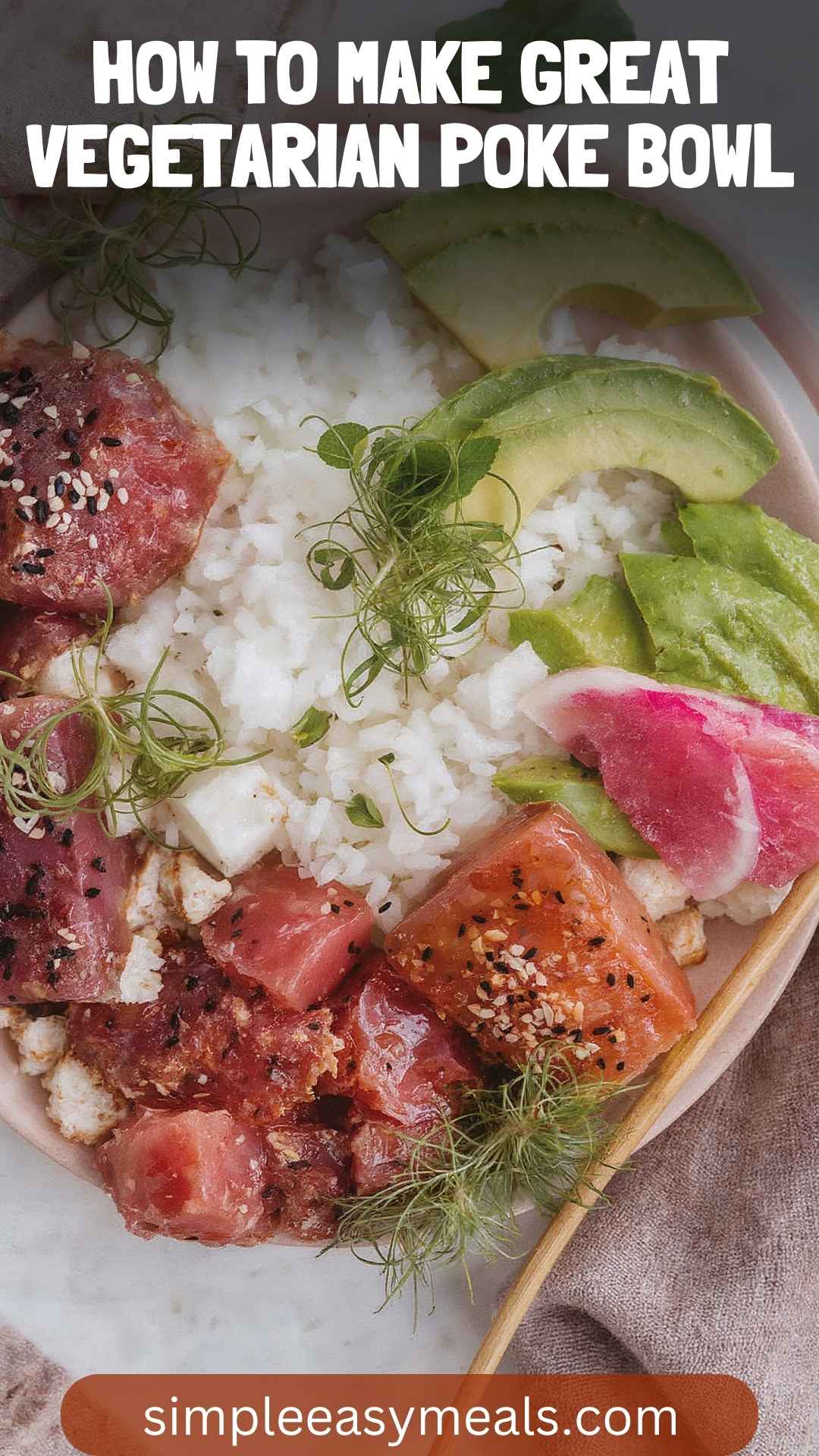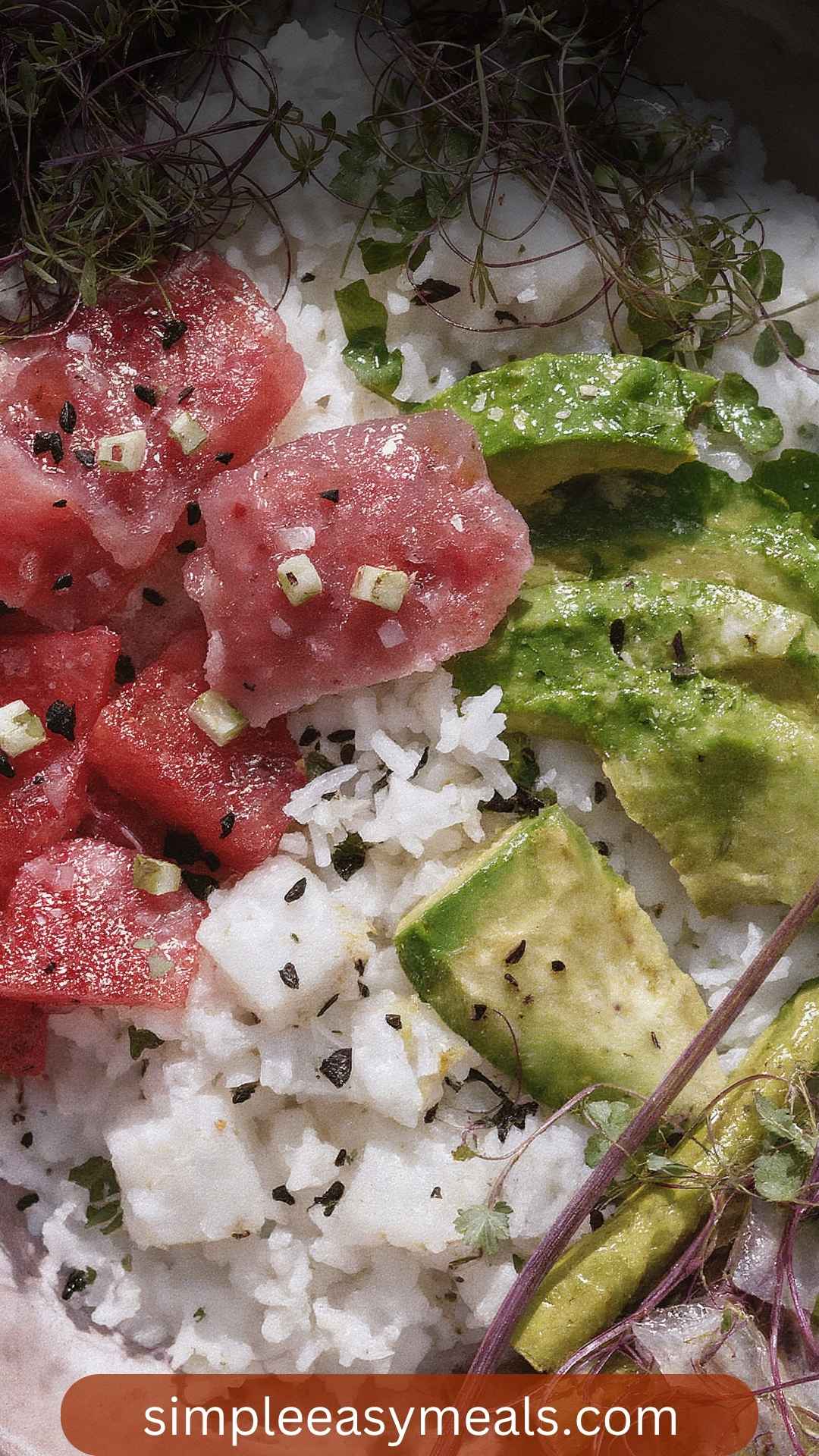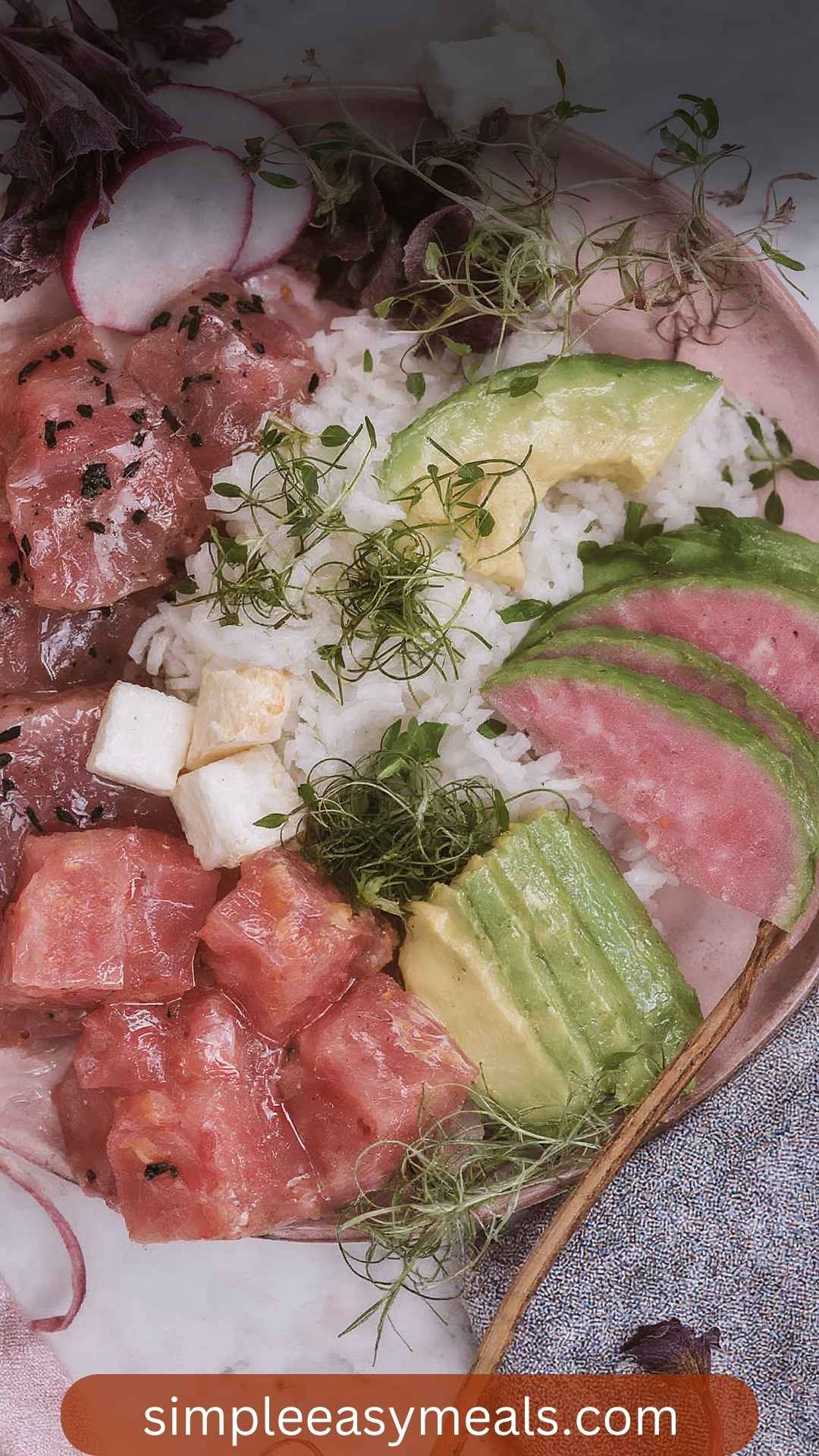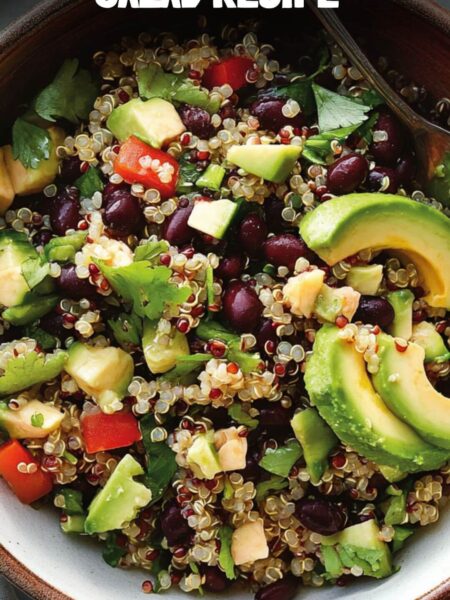Before diving into the how-tos of crafting an incredible vegetarian poke bowl, let’s talk about what you can serve alongside this delightful dish. Poke bowls are versatile and can be accompanied by various sides that complement their vibrant flavors. Here are a few suggestions:
1. Edamame: These bright green beans add a nice pop of color and are packed with protein. Serve them steamed and lightly salted for a simple side.
2. Seaweed Salad: If you love a taste of the ocean, this can be a refreshing addition. The slight saltiness of seaweed salad enhances the poke bowl experience beautifully.
3. Miso Soup: A warm bowl of miso soup is comforting and pairs well with the cool freshness of poke. It’s light yet satisfying.
4. Teriyaki Tofu Skewers: For those who enjoy a bit of grilled goodness, teriyaki-glazed tofu skewers can be an excellent protein-packed side.
5. Pickled Vegetables: Bright and tangy pickled veggies can elevate your meal. They add crunch and flavor balance to the richness of the avocado.

What Is a Vegetarian Poke Bowl?
A vegetarian poke bowl is a deconstructed salad served in a bowl, traditionally featuring diced raw fish. However, this version substitutes the fish with equally tantalizing ingredients such as marinated tofu or watermelon. It embraces the concept of balance, presenting protein, grains, vegetables, and healthy fats in one colorful bowl.
Each component serves a purpose, from the foundation of warm rice to the crispness of fresh veggies. It’s visually appealing and offers a symphony of flavors and textures, mostly driven by the thoughtful combination of fresh ingredients.
What Is the Flavor Profile of This Dish?
A vegetarian poke bowl is packed with mixed flavors that make each bite exciting. The umami from the tofu or watermelon lends a savory depth. The crunch from the fresh sprouts and tang from pickled ginger add layers of complexity. Creamy avocado provides a luxurious feel, and the slight sweetness from shredded carrot brightens the entire dish.
Then, there is the warmth of the rice, which balances the cool freshness of the toppings, and a drizzle of soy sauce or tamari enhances every bite, adding a salty kick. It’s a delightful journey in taste and texture.
What Makes This Recipe Different From Other Vegetarian Poke Bowls?
I pride myself on making recipes that not only taste good but also nourish. Many vegetarian poke bowls emphasize one or two ingredients. My approach will be more inclusive, bringing together various components like marinated tofu, seasonal veggies, and a tasty dressing. This way, each bowl can be customized.
Moreover, we’ll include nutrient-dense toppings like microgreens and asparagus, ensuring each bowl is as colorful as it is nutritious. You won’t find the same depth of flavor and creativity in just any poke bowl recipe.
Ingredients You’ll Need
To craft your outstanding vegetarian poke bowl, gather the following ingredients. These will ensure a delightful experience:
- 1/2 cup organic firm tofu, cubed and chilled: This will be the protein powerhouse of your bowl.
- 1/4 cup blanched asparagus spears (or seasonal vegetables): Add some crunch and a fresh flavor.
- 1/4 cup crisp sprouts or fresh microgreens: For that added vitality.
- 1 tablespoon pickled ginger: A touch of tang brings brightness.
- 1/4 small ripe avocado, thinly sliced: Creaminess that perfectly balances the dish.
- 2 tablespoons shredded carrot: Adding natural sweetness and crunch.
- 1 1/4 cups warm short-grain rice, cooked and fluffed: The hearty base.
- 1/3 cup marinated watermelon poke cubes: This unique ingredient adds a twist.
Optional Garnishes & Drizzles
- Sliced scallions (green onions), for garnish
- Soy sauce or tamari, to taste
- Toasted sesame seeds

Step by Step Directions
Step 1: Prepare the Rice
Start by cooking your rice according to package instructions. Short-grain rice works best, as it is stickier. The perfect bowl begins with a fluffy yet cohesive rice base. Once cooked, fluff the rice with a fork and set it aside to cool slightly.
Step 2: Marinate the Tofu
While the rice is cooking, cut the tofu into cubes. For added flavor, marinate the cubed tofu in soy sauce or tamari. Let it soak for at least 10 minutes. This step is essential, as it infuses the tofu with a deep, savory taste.
Step 3: Prepare the Vegetables
Blanch the asparagus in boiling water for just a minute to maintain its bright color and crisp texture. Plunge the asparagus into cold water to stop cooking. After that, slice your avocado and shred the carrots, keeping everything handy for assembly.
Step 4: Assemble the Bowl
Start with a generous scoop of warm rice at the bottom. Arrange the marinated tofu cubes artistically over the rice. Next, add the blanched asparagus, avocado slices, shredded carrots, and a sprinkle of microgreens. Don’t shy away from getting creative with your layout; people eat with their eyes first.
Step 5: Add the Finishing Touches
Top the bowl with pickled ginger, sliced green onions, and toasted sesame seeds for an appealing finish. Finally, drizzle some soy sauce or tamari over the top.
Step 6: Serve and Enjoy!
Dig in! Take a moment to appreciate the colors and aromas before devouring your creation. Each bite should be a harmonious blend of flavors.
Tips On Making a Great Vegetarian Poke Bowl
Here are some tips to elevate your vegetarian poke bowl game:
- Use Quality Ingredients: Fresh, high-quality produce will make a difference in flavor.
- Get Creative with Vegetables: Switch out vegetables based on what’s in season or what you have on hand. Zucchini, radishes, and cucumbers work great too!
- Marinate Ahead of Time: For more flavor, marinate your tofu overnight.
- Experiment with Dressings: A squeeze of lime, a dash of sesame oil, or a blend of your favorite sauces could enhance the taste further.
- Customize for Your Preference: Add nuts, seeds, or your favorite protein substitutes to match your taste and dietary preferences.
How Can I Store This Vegetarian Poke Bowl?
If you find yourself with leftovers, you can store them in an airtight container in the refrigerator for up to two days. Keep the avocado separate, as it tends to brown quickly. I recommend adding any dressing just before serving to keep everything crisp and fresh.
Substitute Options for the Ingredients
If some ingredients are hard to find, here are alternate options:
- Firm Tofu: Tempeh or chickpeas can serve as excellent protein alternatives if tofu isn’t available. They have their unique textures and flavors.
- Asparagus: Instead, you might use zucchini or green beans. They provide a similar crunch.
- Microgreens: If unavailable, consider using arugula or baby spinach. They add leafiness and nutrients.
- Marinated Watermelon: If watermelon isn’t in season, try cubed mango for a sweet twist.

Conclusion
Creating a fantastic vegetarian poke bowl is a journey of flavor, color, and texture. It’s a dish that invites creativity and experimentation while still delivering on health benefits. You can satisfy an array of dietary needs with delicious ingredients.
So, the next time you’re looking for a fresh meal that continues to impress, look no further than this vibrant poke bowl recipe. It’s simple enough for a weeknight dinner but visually stunning for entertaining. Get ready to impress yourself and others with your culinary creation—your taste buds will thank you!
You’ll also like the following recipes!
How To Make Great Vegetarian Poke Bowl – Simple Easy Meals
There’s something magical about a poke bowl. The layering of fresh ingredients, the vibrant colors, and that satisfying crunch. As a food blogger and registered dietitian, I always seek to create meals that not only taste good but also offer nutritional benefits. One day, while exploring the realm of vegetarian options, the idea struck me—why not craft a vegetarian poke bowl?
The thought of a bowl filled with fresh veggies, creamy avocado, and flavorful marinated tofu truly excited me. This recipe is not just about making a great meal; it’s about finding a perfect mix of flavors and textures that palatable to everyone, whether you’re a vegetarian or just someone looking for a healthy alternative.

Ingredients
Optional Garnishes & Drizzles
Instructions
Step 1: Prepare the Rice
-
Start by cooking your rice according to package instructions. Short-grain rice works best, as it is stickier. The perfect bowl begins with a fluffy yet cohesive rice base. Once cooked, fluff the rice with a fork and set it aside to cool slightly.
Step 2: Marinate the Tofu
-
While the rice is cooking, cut the tofu into cubes. For added flavor, marinate the cubed tofu in soy sauce or tamari. Let it soak for at least 10 minutes. This step is essential, as it infuses the tofu with a deep, savory taste.
Step 3: Prepare the Vegetables
-
Blanch the asparagus in boiling water for just a minute to maintain its bright color and crisp texture. Plunge the asparagus into cold water to stop cooking. After that, slice your avocado and shred the carrots, keeping everything handy for assembly.
Step 4: Assemble the Bowl
-
Start with a generous scoop of warm rice at the bottom. Arrange the marinated tofu cubes artistically over the rice. Next, add the blanched asparagus, avocado slices, shredded carrots, and a sprinkle of microgreens. Don’t shy away from getting creative with your layout; people eat with their eyes first.
Step 5: Add the Finishing Touches
-
Top the bowl with pickled ginger, sliced green onions, and toasted sesame seeds for an appealing finish. Finally, drizzle some soy sauce or tamari over the top.
Step 6: Serve and Enjoy!
-
Dig in! Take a moment to appreciate the colors and aromas before devouring your creation. Each bite should be a harmonious blend of flavors.
Nutrition Facts
Servings 1
- Amount Per Serving
- Calories 596kcal
- % Daily Value *
- Total Fat 19g30%
- Saturated Fat 2.8g14%
- Sodium 23mg1%
- Potassium 84mg3%
- Total Carbohydrate 84g29%
- Dietary Fiber 7g29%
- Sugars 5g
- Protein 28g57%
* Percent Daily Values are based on a 2,000 calorie diet. Your daily value may be higher or lower depending on your calorie needs.
Note
- Use Quality Ingredients: Fresh, high-quality produce will make a difference in flavor.
- Get Creative with Vegetables: Switch out vegetables based on what’s in season or what you have on hand. Zucchini, radishes, and cucumbers work great too!
- Marinate Ahead of Time: For more flavor, marinate your tofu overnight.
- Experiment with Dressings: A squeeze of lime, a dash of sesame oil, or a blend of your favorite sauces could enhance the taste further.
- Customize for Your Preference: Add nuts, seeds, or your favorite protein substitutes to match your taste and dietary preferences.





